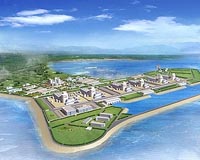 |
Berlin (AFP) Sept 28, 2009 Green groups in Germany vowed on Monday to hit the streets if Chancellor Angela Merkel's victorious new coalition keeps its campaign promise to reverse the country's scheduled exit from nuclear power. The world's worst nuclear accident at Chernobyl in 1986 turned a large part of German public opinion against atomic power, and in 2000 the government of chancellor Gerhard Schroeder decided to mothball all reactors by around 2020. Shipments of radioactive waste to a processing plant in Gorleben in western Germany have attracted mass protests in recent years, while Germany's lack of a permanent storage site has added to nuclear's unpopularity. Currently, Germany's 17 reactors supply around a third of its electricity, with coal and gas producing more than half and renewables such as solar and wind power some 12 percent. Germany is uneasy about volatile gas and oil imports from Russia and the Middle East, and wants to be at the forefront of global efforts to reduce carbon emissions ahead of a crunch UN climate summit in Copenhagen in December. As a result, Berlin has set some ambitious targets. By 2020, the country aims to cut its carbon emissions by 40 percent compared with 1990 levels, and have renewables produce a third of Germany's power needs in the same timeframe. But Merkel's CDU/CSU conservatives and their new coalition partners, the Free Democrats (FDP), believe the life of some of the nuclear plants should be extended, forming what she calls a "bridge" until renewables can fill the gap. Fresh from her election victory, Merkel on Monday vowed to press ahead with what her party had promised on nuclear power, telling reporters: "I don't intend today to go back on what was in our election campaign." Zoe Grainge at consultancy IHS Insight said that the closure could be postponed to around 2037. "While nuclear plants are expensive to build, they are cheap to run, providing large, steady supplies of power for decades without emitting any greenhouse gases," Grainge said. It is clear, however, that Merkel will have a struggle on her hands, with a parliamentary head of the Greens, Renate Kuenast, vowing that the party would oppose a nuclear U-turn both in parliament and with demonstrations. Kuenast, whose party was in coalition with Schroeder's Social Democrats (SPD) when the nuclear exit was approved by parliament, told the Leipziger Volkszeitung on Monday that opposing any change was her "top priority". Frank-Walter Steinmeier, the SPD's chancellor candidate who wants to become the party's new parliamentary head, said on Sunday night that he also would fight any reversal tooth and nail. On Saturday Steinmeier, foreign minister in the outgoing government and Schroeder's former chief of staff, predicted a return of the sometimes violent anti-nuclear demonstrations of the past. "If Germany gives up its leading international role when it comes to abandoning nuclear energy ... the government will get the bill politically," Lutz Mez, energy specialist at Berlin's Free University, told AFP. Mathias Edler, a spokesman for ecologist pressure group Greenpeace, said a "clear majority" of voters, and even most CDU voters, oppose extending Germany's dependence on nuclear power. "If they do it, they will open a whole can of worms in German society again, it is clear," Edler told AFP. "People will go out on the streets, there is no other option." Fellow pressure groups Ausgestrahlt and BUND agreed: "If the new government intends to bow to the demands of the nuclear lobby, then they should expect stiff resistance." "The future of atomic power will be the defining conflict of the next parliament," Ausgestrahlt's Jochen Stay told AFP. Share This Article With Planet Earth
Related Links Nuclear Power News - Nuclear Science, Nuclear Technology Powering The World in the 21st Century at Energy-Daily.com
 China approves building of coastal nuclear plant
China approves building of coastal nuclear plantBeijing (AFP) Sept 28, 2009 China has approved the construction of a new nuclear plant in its eastern coastal region, in the latest step in Beijing's plan to include more clean energy in the country's consumption mix. The State Council, or cabinet, issued a licence last week for the building of the first phase of the Haiyang nuclear power station in Shandong province, the State-owned Assets Supervision and ... read more |
|
| The content herein, unless otherwise known to be public domain, are Copyright 1995-2009 - SpaceDaily. AFP and UPI Wire Stories are copyright Agence France-Presse and United Press International. ESA Portal Reports are copyright European Space Agency. All NASA sourced material is public domain. Additional copyrights may apply in whole or part to other bona fide parties. Advertising does not imply endorsement,agreement or approval of any opinions, statements or information provided by SpaceDaily on any Web page published or hosted by SpaceDaily. Privacy Statement |